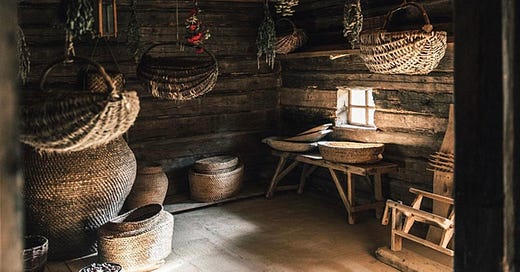A road home
The more I think about personal decolonization, the more I realize that my native language is a key.

My grandma grew up speaking Belarusian. Her family, neighbors, and everyone around her spoke Belarusian in their daily life. I was born in the 90s. Everyone around me spoke Russian, including my grandma. She learned Russian in order to fit into the society that had been gradually Russified over the years.
However, she has never got rid of her Belarusian accent, and she often mixes Belarusian and Russian words when she speaks. Growing up, I thought it was because she was less educated and grew up in a village. Now I understand that my way of thinking was a sign of me being heavily Russified and colonized. I thought of my native language as inferior to Russian, and I was ashamed of speaking it in public. Ironically, my mom was a teacher of the Belarusian language at that time, but she never spoke Belarusian at home or in public for the same reasons. I think it speaks volumes about the colonization and Russification of Belarus that even teachers of the Belarusian language refused to teach it to their children or speak it outside the class.
When I was 18, I was on vacation and met a Russian guy who seemed very smart and charismatic. He spent lots of time abroad and was a freshman at a prestigious Russian university. He casually cited Russian classics in our conversations and looked like a very intelligent guy. I was immediately charmed. I liked him a lot and wanted him to like me back, so I tried to appear better in front of him and was very self-conscious. One day, he mocked my pronunciation and said that I speak with a “villager accent,” that I “don’t speak clean Russian,” and that I need to practice it to “sound like a more educated person.” I was mortified and spent hours mastering “true” Russian pronunciation. The guy faded into oblivion, but my accent stayed unchanged, only now I don’t want to change it, and I am proud of it. Moreover, I intend to switch to Belarusian entirely and leave the Russian language behind as I did with that guy (and I’m so happy I did!).
I was ashamed of my Belarusian pronunciation back then, but when I speak Russian now, I try to pronounce words with a Belarusian accent on purpose. I realized that being Russian doesn’t mean being an educated, intelligent person, as it has been put into my head for years – it means being a colonizer whose country erased dozens of languages and appropriated so many cultures, has been waging wars, oppressing and killing its neighbors for centuries and continues to commit genocide in Ukraine as you read these words.
I often dream of seeing Belarus, which my grandma saw growing up. I would give a lot to be transferred there, even for a brief moment. To hear the first words in Belarusian language from your parents, to practice Belarusian traditions in daily life, to celebrate Belarusian holidays, to sing Belarusian songs, and to wear Belarusian outfits. To live in Belarus, where people celebrate their culture and language, Belarus, where people are not ashamed of being Belarusians.
I feel that relearning my native language is one of the most important and powerful ways to reconnect with my heritage. My language is a key to my home that keeps memories of my ancestors and their stories, family traditions, and old lullabies. The home where I know who I am and where I feel powerful and content. The home that has been preserving my true identity all that time, keeping it hidden, even from myself, patiently waiting for me to be ready to discover it. All I needed was a key to this home, and I think I found it.
***
I want to walk this road to home,
my heart will know the way.
I’ll quietly open the front door
and step in dark hallway.
My home is old, smells of dried grass,
a sunbeam on the floor.
I’ll close the door and say out loud:
Hi
It’s me
I’m home.Whenever I reread this poem I wrote, I feel tears welling up. It’s a very emotional journey of reconnecting with my heritage, but I intend to walk this road no matter how hard it is, hoping it will eventually lead me home.
Warmly,
Darya
Email: daryazorka@substack.com
Follow me on Instagram
Follow me on Twitter
Shop my art on Etsy
Watch Frontline PBS documentaries on Ukraine





I was thinking about your essay and poem as I was walking my dog. I can't fathom how such experiences are internalized. The level of oppression, the constant mind games to keep people 2nd guessing themselves, the gaslighting, those things, at the scale Russia has been getting away with for who knows how long is just alien. You do have a way with words, but I sympathize for the pain that must've been endured to have such clarity...the sadness, the slowly awakening anger. At least the whole world can see, if they want to see, the lies that Russia spews to cover up the monstrosity they are....I do hope Belarus can escape before Luka. sells them out completely down the river because once Russian annexes Belarus they will do to it what they are doing to Ukraine. The things you have shared are are so real, and so surreal, and so humbling.
I was tearing up at the end. ❤️🩹 You’ll get there, the door is open now. ❤️